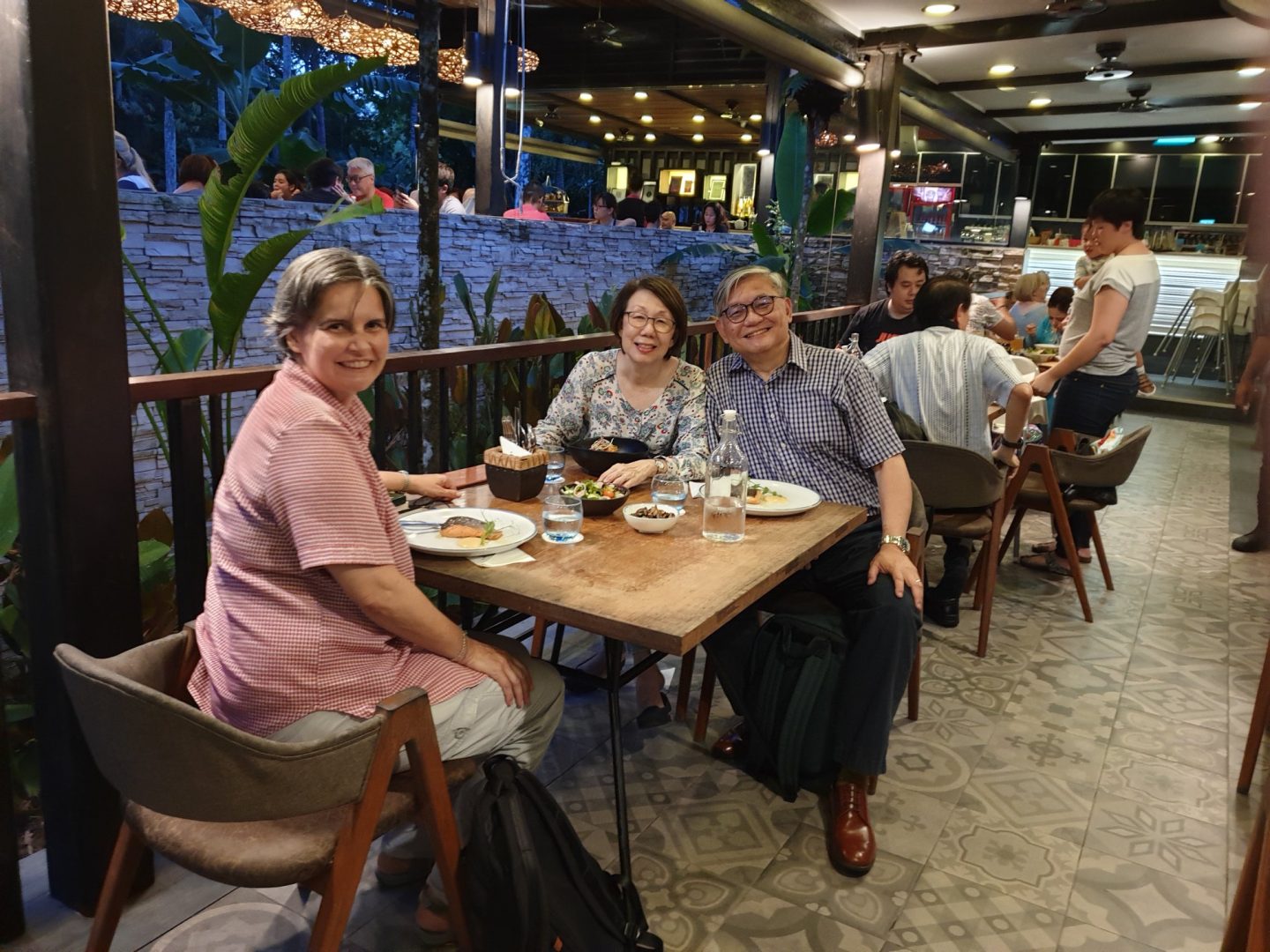Are deeper, 3-2-1 relationships the first step to healing a fragmented world?
Emilyn Tan // January 15, 2020, 4:55 pm

Going strong: Tan Soo-Inn (centre) continues meeting up with his first 3-2-1 group with Lam Kok Hiang (left) and Doug Erdmann (right). All photos from Graceworks' Facebook page.
We’ve gotta eat, right?
In the local church context, there’s hardly a more persuasive reason to get people to gather, and it’s a savoury line Rev Tan Soo-Inn, 64, dishes up often to get them to consider his easy recipe of 3-2-1 for the formation of spiritual friendships.
That’s three friends meeting two hours once a month – a structure he serves up in his same-titled book.
“Many people have a lot of transactional relationships but sharing deep stories doesn’t happen that much.”
Why the hype?
Simply put, we need friends, but we’re not making concerted efforts to form deep friendships.
“Many people have a lot of transactional relationships where they get things done, but sharing deep stories – where we know each other’s hearts, so that we can encourage one another – doesn’t happen that much,” says Tan, the founding director of publishing and training consultancy, Graceworks.
“We need friendship as much as we need food and water.”
Soul food
Conceptually, 3-2-1 was birthed out of Tan’s deep conviction that people are meant to have two key relationships: With God and with other human beings.
Even Jesus had friends (John 15:15), he points out. There was the large group of 72 (Luke 10:1), the 12 apostles (Mark 3:14, Luke 6:13), and the inner circle of Peter, James and John.
“God has created us in such a way that we actually need two relationships: With God and with others.”
In modern times, Tan’s own experience attests to the embrace of those who’ve walked with him through humble hills and desolate valleys. He affirms the joy they’ve brought: “My best memories are of life in community with people.”
More importantly, he has the Beginning on which to develop this reality. “I’ve always noted that the first negative in the Bible was when God said it was not good for the man to be alone (Genesis 2:18). Prior to that, everything is good. And that verse comes at a point where sin had not yet entered the picture.
“Assume Adam had full access to God, and still, it was not enough. Sometimes it feels a bit sacrilegious that God is not enough, but the point is, God has created us in such a way that we actually need two relationships: With God, and with others.”
Best ingredients
The idea of three people in a fellowship, however, is not his own. He readily shares that he was spurred on by author Greg Ogden’s premise of one person discipling two others. “I thought about it and, well, it needn’t be just discipleship. It could just be three peers walking together.”
“Many people’s ‘to-do’ list drives them day by day, but how much time do they actually spend sharing their lives?”
Daniel’s three friends in Nebuchadnezzar’s fiery furnace (Daniel 3:23) came up as an Old Testament reference; Peter, James and John in the Gospels; and Wisdom had it in Ecclesiastes 4:12 that threefold cords have resilience.
“Three seems to be a number that pops up everywhere. So that could be one level of friendship,” Tan observes.
Sifting through more research, he found that Christians are said to connect at four levels: One is the large group – like Sunday worship; another is the social group. “Maybe we share a meal together,” he postulates.
“The third will be the small group, like maybe our cell groups. And then there’s the intimate group of two or three very close friends.
“It is not a matter of which group is more important. I think we need all four groupings. But I think there’s also a place for intimate groups of two or three where we open our heart out to each other at a very deep level of connection.”
Transparency is clearly pivotal. “So many people are relationally poor. They are very hardworking, their ‘to-do’ list drives them day by day, but how much time do they actually spend sharing their lives?
“In Singapore, for sure we’re all driven by activism. ‘Productivity’ – that’s the keyword. Relationships are understood and assumed but, when push comes to shove, it’s getting things done that is the priority.”
Food for thought
Tan anticipates the “no time” refrain and counters it with gentleness and respect, knowing that while simplicity undergirds the 3-2-1 framework, the effects of putting it into place are profound.
Powerful transformation takes place, because this is “friendship that is rooted in Christ for the purpose of helping followers of Jesus grow in Christ”. It is based on a common friendship with Jesus, whose promise is His presence among two or more gathered in His Name (Matthew 18:20).
“As we eat we slow down, we welcome each other, we leave our hectic schedules behind us for a while, and we share our lives,” writes Tan in his book.

There’s always time: Catching up over a meal is among Tan Soo-Inn’s favourite things to do (pictured here with wife Bernice (middle) and Workship author Kara Martin (left).
Meaningful conversation and prayer are intentionally made a part of the mix and, soon enough, the realisation that “we can only have a few intimate spiritual friends” leads us to invest the time that these key relationships need.
As trust is established and strengthened, “the triad can also become a safe place for three key spiritual disciplines: Confession, decision-making and vocational discernment”.
“Mutual unmerited sacrificial love” is practised, being expressed in particular by acceptance (Romans 15:7) and forgiveness (Ephesians 4:32).
It’s easier for a small group of three or four to find a common time to meet. Tan also points out that anything bigger would be less intimate.
Wholesome nourishment
Meanwhile, out of the listening and sharing that goes on – a reciprocal dynamic Tan calls “two parts of one reality” – the discipline of biblical discernment is cultivated. It is the means by which the members “ensure that the triad is not just for helping people feel good”.
“We need to have our stories sifted by the Word of God.”
Such groups are not just therapeutic, they are a context to hear the voice of God. “They exist to encourage growth in Christ-like maturity,” Tan writes, adding: “We need to have our stories sifted by the Word of God.”
Tan has no qualms about stating plainly that he has, in his 64 years of life, traversed the dark alleys of death, divorce and depression. But for “the grace of God that came through the loyal friendships of the small core of friends who never gave up on me”, he says he doesn’t know how he would have survived.
“I’ve been blessed with good friends all my life. I don’t understand why some people choose to like you and walk with you, to be your friend.
“In retrospect, I don’t think I’ve been that good of a friend to them, so it’s a gift. God led these people into my life, and they were gifts. I didn’t deserve them.”
3-2-1 is published by Graceworks, a publishing and training consultancy dedicated to promoting spiritual friendships in church and society, and seeing lives transformed through books that present truth for life. Besides 3-2-1, Graceworks has a comprehensive slate of other faith-based resources, available at graceworks.com.sg.
Start a 3-2-1 this new year!
Swallow your words before you say you don’t have time. There’s more than food to chew on here: 3-2-1 is friendship that is initiated by Jesus, so begin in prayer. Ask the Lord for the people who would form your group, while keeping your eyes open for those with whom you can share a communion of agape love.
Once the group is in place, lay out the vision, sharing the content of the 3-2-1 book. Ask one another: Is this what you want?
Bear in mind that, generally, groups outgrow their stated purpose. At the end of each year, the option to continue or conclude is open for discussion. Tan qualifies: “I only ask this because I want the commitment to be intentional. We don’t just flow along because of the momentum but because we actually believe in it.”
Groups might close for a variety of natural reasons – including job shifts, overseas postings or migration – but the friendship remains as “a structured way of walking with a few people for a season in life, but it by no means exhausts the whole experience of friendship”.
Believe it: Good friends never say goodbye.
We are an independent, non-profit organisation that relies on the generosity of our readers, such as yourself, to continue serving the kingdom. Every dollar donated goes directly back into our editorial coverage.
Would you consider partnering with us in our kingdom work by supporting us financially, either as a one-off donation, or a recurring pledge?
Support Salt&Light



